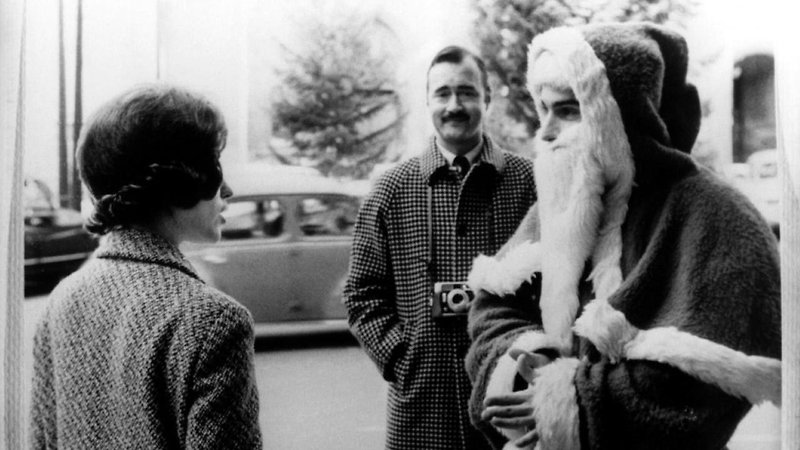
Screened as part of NZIFF 2002
Santa Claus Has Blue Eyes 1966
Le Père Noël a les yeux bleus
"Eustache made his second film with 35mm black-and-white stock left over from Godard’s Masculin/Féminin, and he also used that film’s star, Jean-Pierre Léaud. But where Godard’s film was a snapshot of Parisian youth with time on their hands, Eustache’s was a portrait of existence for a poor young man in the provinces, specifically the director’s hometown of Narbonne. Eustache gives us a closely-scaled, intimate portrait of Daniel and the town he lives in. His photographer friend engages him to dress up as Santa Claus for the holiday season and have his pictures taken with passers-by, giving him a different vision of Narbonne and its inhabitants. A wonderfully earthy film, and Eustache’s first major work." — Film Society of Lincoln Center
"Eustache followed Bad Company with Santa Claus Has Blue Eyes, a very similar film, and something of a further step towards The Mother and the Whore, with Jean-Pierre Léaud (as Daniel) taking his place at the center and essentially creating the character he would develop seven years later, an aimless, self-absorbed, morally stunted young man. The blatantly criminal, detestable behavior of the characters in Bad Company has been toned down (Daniel and his friends shoplift and pull off a scam at a bingo parlor, but nothing they do has the sting of the robbery in the earlier film), and the comedy intensified – the title refers to Daniel’s job posing for photographs on the street in a Santa costume, a job he comes to treasure because, in his own words, ‘Girls who once had snubbed me now smiled and had their photos taken. At first I just touched their shoulders but soon I realized I had nothing to fear. Soon I was groping every one of them.’ Daniel is far more sympathetic than the main character in Bad Company, partly because the emphasis is on his failings, awkwardness, and weakness, and also because of Léaud’s presence. It’s difficult to dislike Léaud, to judge him – he brings an element of absurdity, of transparency, to every role he plays, so that no matter how detestable his behavior, we seem to see the human being underneath. But the nagging sense of despair has not dissipated – it’s still hovering.
In both these early shorts, relations between the sexes is a matter of resignation and empty distraction rather than connection or genuine feeling – there’s no love or tenderness, only groping and conquest." — Jared Rapfogel, Senses of Cinema